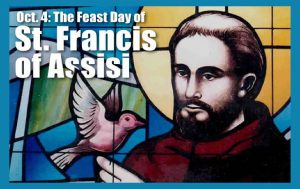Memorial of Saint Francis of Assisi
Readings: Bar 4:5-12, 27-29; Ps 68, Luke 10:17-24.
The first week of October is remarkable for its litany of saints in the Liturgy –Thérèse of the Child Jesus and Francis. People’s fascination with them is found far beyond the precincts of the church. Within the church, Thérèse is treasured for her so-called ‘Little Way’, the life of love while Francis is feted for his love of life. Francis has found a new and greater audience through his namesake – the Jesuit Pope who chose to be called after the Franciscan Poverello, the poor, little man of Assisi.
There is a wonderful symmetry between the titles and openings of Pope Francis’ two major documents on ecology and the ‘Climate Crisis’ – the one beginning “LAUDATO SI’, mi’ Signore” – “Praise be to you, my Lord”, the other “Laudate Deum” – “Praise God for all his creatures”. The laudatory link between these two documents is the bridge between Creator and creatures, the latter comprising the whole of nature, including humanity. A line from the Second Vatican Council links creation and Incarnation – ‘God, who creates and conserves all things by his Word, provides constant evidence of himself in created realities’.[1] This reflects the Franciscan theological tradition which sees the Son of God’s coming in the flesh as the crowning of creation, Christ as the cosmic head of – as the Gospel of John states – ‘all things that came into being through him’ (1:3).
 A review of a recent book recorded that ‘Francis is a figure whose legacy continues to capture the popular imagination in 21st century Europe’.[2] The title of the book under consideration Francis of Assisi: The Life of a Restless Saint communicates the appeal that the Poverello contains for people today which is not confined to the Western world. Like the creation that he loved and lauded which goes through its own restlessness revealed in the passing of the seasons, ‘the almost continuous drama of his life’[3] conveys the call by God who brought him into being so that, in the concluding words of the reading from the book of Baruch today, ‘he [will] rescue you and give you eternal joy’. Francis of Assisi rejoiced in these words and the hope they retained for him throughout his life on earth.
A review of a recent book recorded that ‘Francis is a figure whose legacy continues to capture the popular imagination in 21st century Europe’.[2] The title of the book under consideration Francis of Assisi: The Life of a Restless Saint communicates the appeal that the Poverello contains for people today which is not confined to the Western world. Like the creation that he loved and lauded which goes through its own restlessness revealed in the passing of the seasons, ‘the almost continuous drama of his life’[3] conveys the call by God who brought him into being so that, in the concluding words of the reading from the book of Baruch today, ‘he [will] rescue you and give you eternal joy’. Francis of Assisi rejoiced in these words and the hope they retained for him throughout his life on earth.
[1] ‘Dogmatic Constitution on Dogmatic Revelation’, Par. 3.
[2] Andrew Roycroft, Ticket – The Irish Times, 29th March 2005.
[3] Adrian House, Francis of Assisi, Pimlico: London 2001, xvi.

